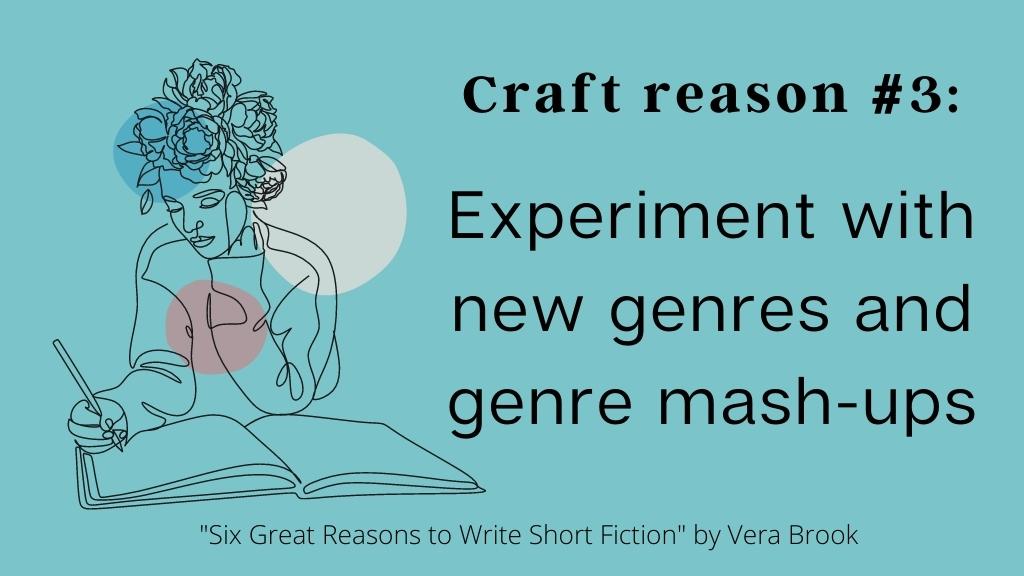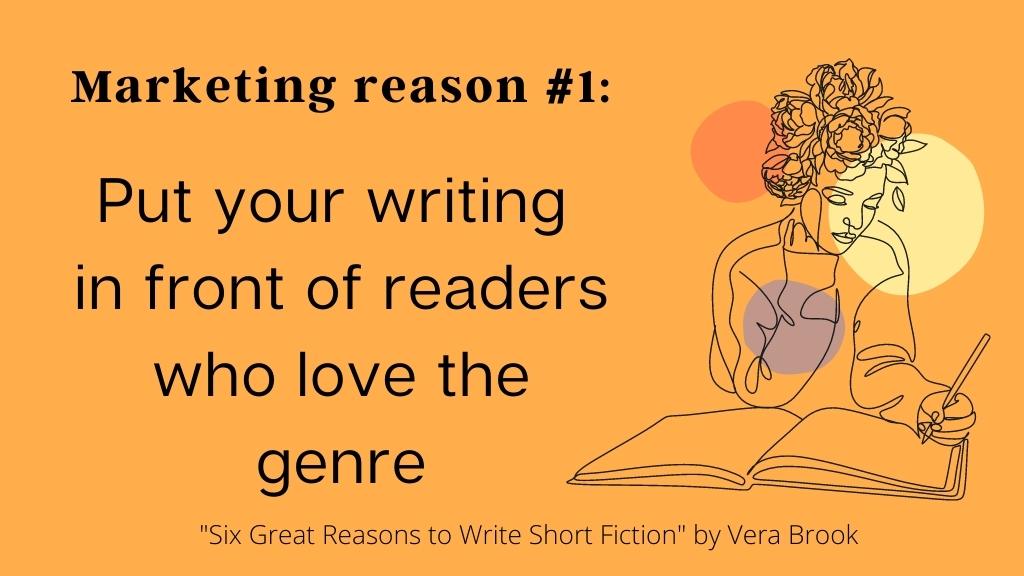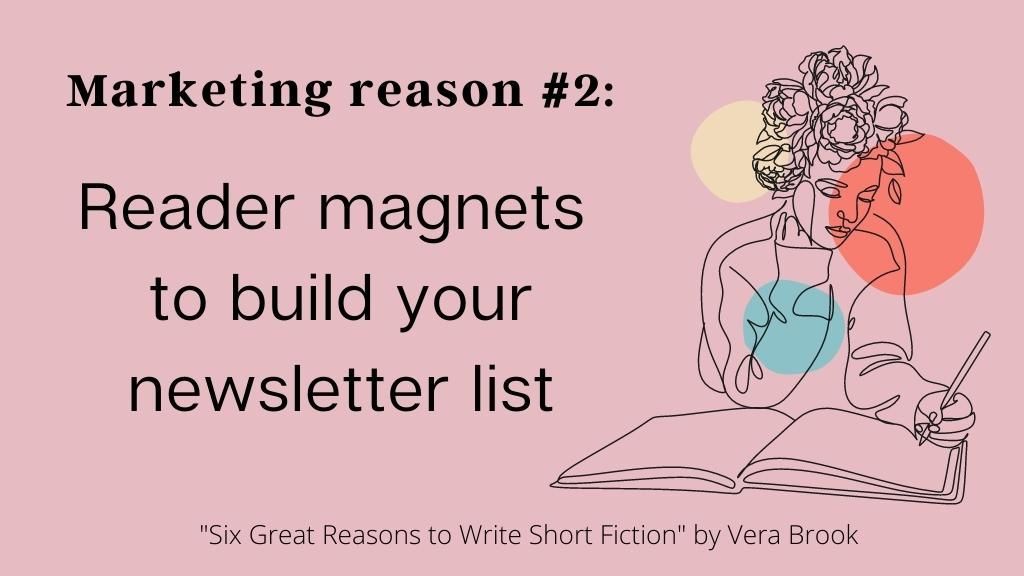SIX GREAT REASONS TO WRITE SHORT FICTION
By Vera Brook
You may have glanced at the title of this post and shrugged. “I write novels and series. I’m not interested in short fiction.” Maybe you even rolled your eyes. “It’s just not worth my time.”
But wait! Don’t go away yet. I promise there are great reasons to consider writing short fiction alongside your novels and series—both to hone your craft and to market your longer fiction and reach new readers. So let’s dive in and discuss six of these reasons, shall we?
Actually, it might be helpful to first define short fiction. I dwell in the world of science fiction and fantasy, and in that world, we break down short fiction into four main lengths. Flash fiction is typically 250 to 1000 or 1500 words; a short story is between1500 and 7500 words (with 3000 to 5000 words considered a sweet spot); a novelette is 7500 to 17500 words; and a novella is 17500 to 40000 words. Anything longer than 40000 words is a novel. Other genres may use different definitions, so it’s good to familiarize yourself with some short fiction in your genre.
I also want to mention from the start: if you want to write short fiction, you need to read short fiction first. Not a huge amount, but some. It will help a great deal. If you find a story that absolutely blows you away, you can study it for craft and apply what you learn in your own writing. And by searching for short fiction to read, you will also discover markets where you could submit and publish your own short fiction later on.
How do you find short fiction to read? There is a rich plethora of short fiction magazines and anthologies out there, some in print, some digital, and many available in both formats. My favorite tool to search for magazines and anthologies (to submit to but also to read), and to track my submissions, is the Submission Grinder. You can search by genre and length, pay rate, response time, etc. And it’s absolutely free to use (although you could support the creator to help the good thing going). The Best of… anthologies are also a great choice, as long as they are pretty recent.
Okay. Let’s first talk about the benefits of writing short fiction in terms of craft, and then about all the different ways to use short fiction to market your longer works and widen your readership.
Craft reason #1: Practice and improve your openings.

The openings of novels are crucial. When a reader comes across your book on Kobo or Amazon, they’re very likely to open the ebook sample and read the first chapter or so. If the opening grabs them and pulls them in, they will get the book. The same happens in physical bookstores. The reader picks up a paperback and reads the first few pages.
The opening is crucial! But how often do we get to practice writing the opening? If you write long novels, not very often. Just once per novel. Short fiction lets you practice writing different kinds of openings and get better and better at them. A super helpful skill that you can directly apply when writing your next novel.
Craft reason #2: Practice and improve your endings.

If the opening sells your current book, the ending sells your next book (or so the saying goes, and I think it’s true). But as novelists, how many endings do we get to write? Not many. Again, just one per book. Short fiction lets us write lots of endings and different kinds of endings, and as with openings, practice makes perfect, and the improvement is directly applicable to novel writing. Stronger, more effective endings could also make a huge difference for the success of your series, where the read-through rate is critical and you want to do your best to compel the reader to jump directly to the next book in the series.
Craft reason #3: Experiment with new genres and genre mash-ups.

Maybe you write crime mystery and want to try adding a speculative element, like a futuristic technology or a paranormal ability. Or vice verse: you write speculative fiction but want to venture into the psychological thriller territory.
However, it can be daunting to jump straight into writing a novel in a new genre. Short fiction is a perfect playground to try it out and see what happens, without investing too much writing time and effort. In fact, even reading short fiction in a new genre is a great way to get the lay of the land, including popular tropes that you could play with and subvert as you wish—as long as that short fiction is current, published in the last decade or so.
So far so good? Great. Onward to using short fiction for marketing!
Marketing reason #1: Put your writing in front of readers who love the genre.

Let me ask you this: What’s the biggest challenge for writers today? It’s discoverability, isn’t it?
Whether you are self-published, with a small indie press, or with a traditional publisher, it is incredibly tough to get readers to find your book. I don’t know how many millions of books there are on Amazon, but it’s an astronomical number, and advertising is expensive.
If only there was a way to reach the readers in your genre—the readers who are most likely to enjoy your writing—and introduce yourself to them… Well, there is! Short fiction magazines in that genre. If you can get your story published in a magazine like that, guess what will happen? Hundreds or thousands of readers who already love the genre will read your story and discover you, the author, and all your other books! I discovered some of my favorite authors that way—by reading their short story in a magazine first.
If your flash fiction or short story or novelette gets published in a top tier market, you will also get paid a nice amount; and even better, if the contract is good, you will get paid for only for the first-publication rights and anthology rights, but you can republish your short fiction in your own collection later on.
Imagine that! A terrific promotion—and you get paid for it, instead of the other way around.
To be fair, the best magazines and anthologies are competitive. Don’t expect to send them your first story and get an acceptance email (although if you do, congrats!). Rather, think of short fiction as part of your writing journey. It will take time to write good short fiction; it will take time to get it published. But I truly believe it’s worth it. In fact, personally, I consider writing and submitting short fiction as important to my writing career as my novels or series, at least for now.
One last idea: When you are done with a series, consider writing a short story in that world. In most magazines, if your story gets published, it would be accompanied by your short bio, and the bio could mention your series and encourage the readers to pick up book one. Be careful not to include spoilers in the short story. And just to be safe, you could center it on a minor character or event, rather than the major character or the main story arc. But if your story is compelling and intrigues the readers enough to want to know more, you could gain new fans for your entire series!
Marketing reason #2: Reader magnets to build your newsletter list.

Short fiction also works great as a reader magnet (for new readers to sign up for your author newsletter). By definition, short fiction is short, and therefore takes less time and effort to write than a novel. This makes it easier to give it away for free than an entire novel, especially when you are just starting out and only have a few novels published (like I do). And a fun short story or novelette can still entertain the readers and, if they like it, bring them one step closer to becoming your fans.
The last bit of advice on reader magnets: Use a strong, compelling short story. It should be as good as you can make it in terms of your writing craft, even if it’s short. Don’t forget that the goal is to woo and impress a new reader enough to read more of your work and become a loyal fan over time. A careless, poorly edited short story will not cut it, and you could actually lose a reader that way.
Marketing reason #3: Gifts to reward your loyal fans and keep them engaged in between books in a series.

Another terrific way to use short fiction is as a gift for your loyal fans, already on your mailing list. And one time when such a gift might come in handy? When you are in between books in a series, and your fans are anxiously awaiting the next installment. Unlike with a short story that you would submit to a magazine, for new readers who are not familiar with the series, here you are writing primarily for fans who know the characters and the plot inside out. You may still want to be careful with major spoilers, just in case a few readers are behind in their reading. But you have more leeway in terms of what you could refer to in the short fiction, and it might be fine to assume quite a bit of knowledge of the series already.
A quick mention, since this post is already getting long: Many authors use short fiction as Patreon rewards for their supporters. It’s a similar idea to gifting a short story to your fans through your newsletter. And the best part? Whenever you gift short stories to your fans, once you have enough stories, you could publish a collection of your short fiction! How cool is that? I adore individual-author collections. And it’s another book to your name, so helps with discoverability too.
One last thing I wanted to mention: Nowadays, both reader magnets and gift copies are distributed electronically, and that’s especially true for short fiction, which may be too short to publish as a paperback. So basically, you would use an ebook version of your short story or novella to give away. You want to make sure that the ebook is correctly formatted, including epub and mobi files, but the distribution can get complicated pretty quickly because of all the reading devices out there. So my recommendation would be to use a service like BookFunnel where you can open an account (for about $20 a year currently), upload the files with your short story (you will need a cover!), set up a landing page for the readers to download the ebook, and then share the link.
That’s all for now. I think I ran over the word limit a little bit. (Oops. Sorry, Vania. I hope that’s okay.)
Before I let you go, here are a few of my favorite resources on the craft and the marketing uses of short fiction. Best of luck with your writing!
Resources:
Writing Excuses podcast – a long-running podcast about writing and publishing fiction, with the focus on helping the listeners improve their craft and become better writers.
Mary Robinette Kowal’s guest lecture on writing short stories – part of a series of lectures on the craft of writing science fiction and fantasy directed by Brandon Sanderson.
Kristin Kathryn Rusch’s lecture “How to Write A Short Story: The Basics” – practical advice on crafting short fiction from an award-winning, multi-genre professional writer and editor.
The Submission Grinder – a free online tool to search for short fiction markets and track your own submissions.
The Science Fiction & Fantasy Writers of America (SFWA)’s collection of model publishing contracts – includes anthology and magazine contracts.
Vera Brook is a science fiction, fantasy, and romance writer, and the author of the SAND RUNNER SERIES. Her latest book, THE KISS, a paranormal love story, came out in November 2021. She’s working on two entirely new series, a standalone novel, and a whole lot of short fiction. You can learn more about her writing on her website at verabrook.com. She also tweets about her writing journey, books she loves, and things that interest her at @VeraBrook1.
Copyright © 2022 by Vera Brook


Loved this post! So much good info in one spot! Thanks, Vania and Vera! 🙂
LikeLiked by 1 person
I think Vera loves resources and links just as much as I do! Thanks for reading, Ms. Felicia!
LikeLiked by 1 person